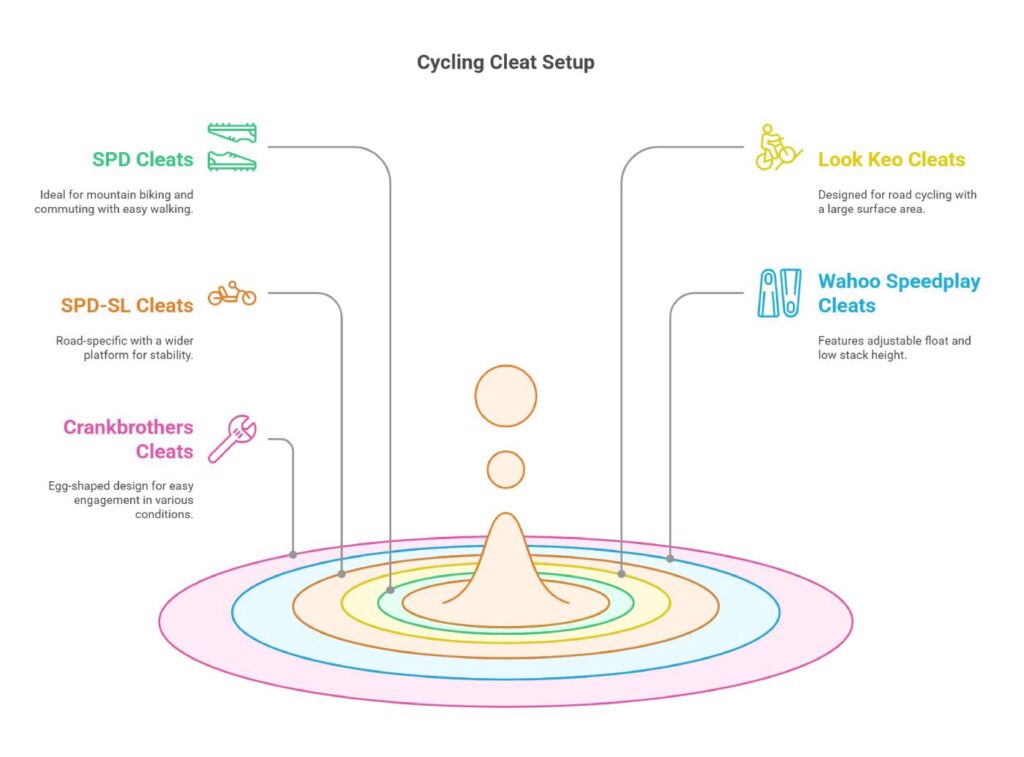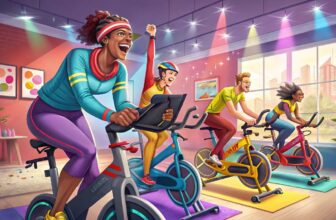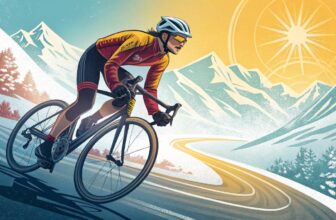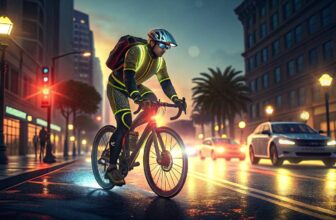Imagine transforming every pedal stroke into pure efficiency and control. Whether you’re a weekend warrior or a daily commuter, your cycling experience hinges on the often-overlooked cleat setup. Welcome to this Guide – your go-to resource for mastering the connection between foot and pedal.
Dive in as we unravel the secrets to optimizing your cleat configuration, enhancing comfort, and boosting performance.
Say goodbye to wasted energy and hello to smooth, powerful rides. Ready to pedal like never before? Let’s clip into excellence together!
Understanding Cleats for Cycling
Cleats? They’re your cycling sidekick, the trusty connection between your foot and pedal that turns a nice ride into a powerhouse of efficiency and control. Below, we’ll explore why cleats matter and the different kinds you might consider.
Importance of Cleats in Cycling
Think of cleats like that solid handshake at a job interview. They ensure your foot is locked tight to the pedal, letting you make the most out of each rotation. No more wasted energy—just smooth, strong strokes (source: Cyclingnews). They also keep your foot in the right spot, which is golden for a smooth, effective pedal spin.
Now, these little guys usually include a spring mechanism that hugs onto the cleat as you clip in. To unclip, just twist your foot away from the bike. Simple, right? This setup doesn’t just make sure all your power gets to the wheels, it also makes for a safer ride, especially when things get a bit hairy on the trail or road.
Types of Cleats in Cycling
Cleat shopping ain’t one-size-fits-all. Here’s a cheat sheet for picking the right type for your rides:
| Cleat Type | Best For | Key Features |
|---|---|---|
| SPD | Mountain Biking, Commuting | Easy dual-sided entry, solid and walk-friendly |
| Look Keo | Road Cycling | Big platform for power, smooth ride |
| SPD-SL | Road Cycling | Stable ride, focused power |
| Wahoo Speedplay | Road Cycling, Performance Buffs | Easy entry, adjust how much your foot can move |
| Crankbrothers | Mountain Biking, All-arounder | Light, quick in and out |
SPD Cleats
SPD, or Shimano Pedaling Dynamics, is the go-to for mountain bikers and folks dodging traffic on the way to work. They click in from both sides, so no need to fumble around. Plus, when you hop off the bike, they hold up well and are comfy for walking about.
Look Keo Cleats
If you’re rolling down smooth roads aiming for speed, Look Keo might be your jam. They provide a larger pedal area, ensuring every ounce of effort counts. Cyclists who chase after performance swear by them.
SPD-SL Cleats
These cleats are the big brothers to the smaller SPD ones—meant for road warriors seeking stability and consistent power delivery. They’re the go-to for those cracking out long miles or focusing on precision and endurance.
Wahoo Speedplay Cleats
Wahoo Speedplay cleats mix ease and range of motion. With their unique dual-sided click-in and adjustable float (how much your heel can swivel), they’re loved by performance enthusiasts who want options and control.
Crankbrothers Cleats
Adventure awaits with Crankbrothers—a favorite for those exploring rough trails. They’re lightweight, so clipping in is a breeze when the trail gets wild, making them great companions in unpredictable terrains.
So, whether you’re new to bicycles or planning a coast-to-coast trek, knowing your cleats will help you pick the perfect pair for your pedaling escapades.

Adjusting Cleats for Optimal Performance
Get your pedal game on fleek with the right cycling cleat setup! Whether you’re fresh off the bike rack or a seasoned pedal pusher, the right cleat adjustments can mean the difference between zipping through the streets comfortably or feeling like your feet are auditioning for a torture chamber.
We’re here to sneak you some cheat codes to adjust those bad boys for maximum oomph in comfort, efficiency, and power transfer.
Fore/Aft Position Adjustment
Think of the fore/aft position like the Goldilocks zone for your foot—the sweet spot that hits just right for power and ease. Whether you’re pulling a Sunday stroll or gearing up for Tour de France dreams, start by lining up those cleats squarely with the ball of your foot.
Chasing endurance? Slide those puppies back a smidge. This shift lessens the workout for your calves—think of it as a lazy-day foot massage that keeps your legs grateful after long miles. Sprinters? You might want to bear down right under that toe, embracing full-throttle kick-offs toward glory.
| Rider Type | Fore/Aft Position |
|---|---|
| Road Cyclist | Smack dab over the ball of foot |
| Endurance | A hair back from ball of foot |
| Power Sprint | A hair back from a ball of foot |
Side-to-Side Adjustment
Ever felt like your bike’s a tightrope act, juggling foot balance and knee wobbles? Cue the side-to-side cleat dance. This dance’s other name? Q Factor. Adjust it just right, and your bike suddenly feels less circus, and more seamless.
- Spread out: Nudge cleats inward. It’s like giving your knees a chill pill.
- Pull in: Push cleats outwards if your legs gotta dance more tango, less splay.
Picture lining up your hip, knee, and foot as a straight-shooting trio, all singing the same tune to bigger adventures and fewer injuries.
Rotational Alignment Adjustment
Sometimes your feet have their mind. Rotational alignment lets them lead. Get the toe in/out groove, and it can keep your knees humming with happiness and ease your pedal push.
| Adjustment | Benefits |
|---|---|
| Toe In | Helps soothe inside knee aches |
| Toe Out | Great for ouchy outer knee vibes |
| Neutral | Start line for the undecided |
Begin from a neutral base—it’s like pre-tuning your guitar before a solo. Feel it out with trial and error, adjusting till riding feels less “ow” and more “wow.” Need more tips to spice up your cycling? Skim through our cycling performance gear and cycling recovery tools articles for more pedal-powered goodness.
Factors to Consider When Setting Up Cleats
Getting your cleats dialed in just right brings a fresh spin to your cycling game. Keep these pointers in mind for making those pedal moments as comfy and powerful as they come.
Float Tweaks
Float is your foot’s wiggle room when you’re all clipped in. Pedal systems have their moods, but most folks find their happy place between 6 and 9 degrees (BikeRadar). Getting this right saves your knees from feeling like they’re twisting into knots, keeping your rides smooth.
| Float Degree | What It Feels Like |
|---|---|
| 0° – 3° | Almost no give—serious cyclists’ turf |
| 4° – 6° | Just the right mix of tight and loose |
| 7° – 9° | Gives you a roomy feeling to keep those joints happy |
Pedal Tension Tweaks
Pedal tension is like the pedal’s handshake with your shoe. Too tight, and beginners might wince—too loose, and you’ll pop off without wanting to. Seasoned riders might go for a tougher grip, while newbies may like it easier. Do what feels best to avoid any wobbly awkward moments.
Height Checks
Cleats give you a lift of 1-2cm right under your soles, shaking up your saddle setup a bit (Cyclingnews). If you’re leveling things out, keep your saddle and riding stance game strong by making the right call on those heights.
| Factor | Choose Your Spot |
|---|---|
| Cleat Height | Add a couple of cm |
| Saddle Height | Tweak for cleat lift |
| Riding Stance | Balance out to stay comfy |
Nail down these tweaks so your ride feels less like work and more like a breeze. Need more stuff to read about getting your bike to fit like a glove? Check out our thoughts on bike fitting accessories and how to pick a bike saddle. And remember, giving those cleats some regular love and attention keeps them in fighting shape.
Pump Up Your Pedals: Get the Most Out of Your Cleats
When it comes to biking, those little cleats on your shoes can make all the difference in the world for comfort and power. Whether you’re just getting started, biking to work, or cruising through long hauls, tweakin’ those cleats can change your whole riding experience. So, let’s break it down: how to fiddle with your cleats to keep your feet awake, ease up on those calves, and speed up your sprints.
Keep Feet Happy, Not Numb
Cyclists often moan about numb toes and feet. It’s not great, but there’s a fix! Move those cleats a tad behind where the ball of your foot hangs out. This little adjustment helps release the squeeze on those nerves and blood vessels hiding under your toes.
| Cleat Position | Goodbye, Numbness! |
|---|---|
| Just Behind Ball of Foot | Less Nerve Squeeze |
Shifting ‘em back gives your toes a break, turning a wobbly foot ride into smooth sailing. For all you comfort seekers, check out our chosen bike saddle tips to stay cushy on the go.
Calf Pressure? No Thanks!
If your calves cry out loud after biking, maybe it’s your cleat’s fault. Try sliding ‘em back on your shoe. This swaps out some calf strain for a smoother ride.
| Cleat Position | Calf Chill Factor |
|---|---|
| Back a Bit | Less Calf Workout |
This is a game-changer for those endless rides when you need to save every ounce of leg strength. Peek at our cycling hydration guide for ways to keep your energy up as you eat up the miles.
Need for Speed: Acceleration
Want a speedy start and an extra push when pedaling? Plant those cleats under the ball of your foot for some serious power boost.
| Cleat Position | Pedal Pushing Power |
|---|---|
| Under Ball of Foot | Boosts Power Transfer |
Lining up here cranks up the speedo, allowing quick take-offs and zippy sprints. For more pep in your cycling step, check out our cycling performance gear advice.
Adjusting your cleat setup can be the MVP of both comfy rides and efficient pedal pushing. Tailoring them just right for your feet can lead to kickass rides without the aches. If you’re the tinkering type, explore our cycling tool kit and bike fitting accessories to trick out your ride to perfection.
Cleat Setup for Power Transfer
Getting your cleats sorted can really boost how efficiently you pedal, making every ride feel easier and faster. Let’s get into tweaking your setup, focusing on stance width and cleat upkeep.
Stance Width Adjustment
When we’re talking about stance width, we mean how far apart your feet are on the pedals. Getting this just right isn’t just about feeling comfy; it’s about maximizing the power you put into every pedal push. And hey, it can even help with issues like knee pain or that annoying inward knee twist.
To fine-tune your stance:
- Watch how your legs move when you’re pedaling.
- Shift your cleats so your legs can naturally do their thing.
- Tweak until you find that sweet spot where your legs feel fab.
Stance Width Table
| Stance Quirk | What to Do |
|---|---|
| IT Band pain | Give your stance a bit more space |
| Knees going inwards | Set cleats to a straightforward stance |
| Knees going outwards | Bring the stance back in |
| General discomfort | Make little tweaks and see what feels better |
Cleat Wear and Maintenance
Taking care of those cleats is like giving your pedals a shot of espresso. It keeps everything running smoothly and can save you from a nasty fall.
Cleat Maintenance Tips
- Check Regularly: Have a monthly peep at those cleats for any signs they’re giving up.
- Swap Them When Needed: If they start wearing down or aren’t clipping in well, get new ones.
- Keep Them Clean: Mud and gunk can mess with your pedal game, so keep them nice and clean.
Cleat Wear Clues
- Trouble Clipping In/Out: If it’s becoming a circus act, your cleats might need replacing.
- Less Stability: If your foot feels shaky or misaligned on the pedal, it’s time for a change.
- Noticeable Wear: Rough patches or misshaped areas mean it’s time for shiny new cleats.
Want to dig even deeper into keeping your bike in top shape? Check our handy bike maintenance tools guide.
By paying attention to these cleat tips, you’re not just upping your power game—all-around bike performance gets a lift. Keep things in check, and your rides will feel like a breeze.
Choosing the Right Cleats for Your Bike
Getting the best cleats for your bike ain’t just a trivial choice; it can change the game when it comes to your life on two wheels. With so many different types of cleats out there, each bringing its own flavor to the table, we’re here to break ’em down: SPD, Look Pedals, Speedplay, and SPD-SL cleats. Check ’em out and find your perfect fit.
SPD Cleats for Versatility
SPD (Shimano Pedaling Dynamics) cleats are like the Swiss Army knife of the cycling world. They get along with road, mountain, and city cyclists alike. Their compact design makes strolls easy-peasy, earning points from those on the daily grind in the city.
| What It’s Got | What It Means |
|---|---|
| Pedal Type | 2-hole |
| Best Of Both Worlds | Multipurpose awesomeness |
| Walking Ease | High |
| Easy Peasy Use | Moderate |
Perfect for newbies, SPDs help you click in and out with ease, boosting confidence. To keep your bike safe, discover our bike lock types guide.
Look Pedals for Road Efficiency
Look Pedals cater to those who live for long road rides. They’re all about covering ground swiftly with their expansive contact area that juices up power transfer for those big miles.
| What It’s Got | What You Need |
|---|---|
| Pedal Type | 3-hole |
| Best For | Road warriors |
| Walking Ease | Not much |
| Maximum Power | High |
For a smooth ride with Look Pedals, don’t forget to check out our tips on sprucing up your ride with our bike computer guide.
Speedplay Pedals for Lightweight Design
Speedplay Pedals will make the weight-watching cyclers happy. They’re featherlight with a double-sided entry that makes hopping on and off a breeze.
| What It’s Got | What’s Cool |
|---|---|
| Pedal Type | 4-hole |
| Best For | Light feet feel |
| Walking Ease | Medium |
| Entry and Exit Ease | Super |
With these pedals, tweak them to fit your style, and ride out in the rain with our cycling rain gear.
SPD-SL Cleats for High-Performance
SPD-SL cleats mean business. If you’re after a solid connection for high stakes road racing, these are the ones for you.
| What It’s Got | What Makes It Special |
|---|---|
| Pedal Type | 3-hole |
| Best For | Speed demons |
| Walking Ease | Low |
| Ready, Set, Go Power | High |
Favored by the pros, these pedals ramp up your skills with a boost in power transfer and efficiency. Stay at your best with our cycling hydration guide.
When scoping out cleats, it’s all about what ticks your boxes. Whether you want versatility, a road-efficient edge, something lightweight, or high-octane performance, there’s a cleat with your name on it. For more tips on making your ride as comfy and safe as possible, dive into our cycling protection gear guide.
Understanding Bike Shoes and Cleats
Pairing the right bike shoes with cleats is your ticket to cycling like a pro. Get the lowdown on why they’re important, the snags you might hit, and the options out there.
Importance of Bike Shoes in Cycling
Bike shoes aren’t just for looking cool. They’re real game-changers for pedaling and power. Unlike regular sneakers, these kicks hook your feet to the pedal system just right. With 2-hole or 3-hole cleat designs, you’ll stay glued to the pedals like peanut butter to jelly.
Here’s how bike shoes can pump up your ride:
- Boosted Energy Transfer: Their stiff soles mean your energy rockets straight to the pedals.
- Improved Control: Secure attachment = better control of your two-wheeled beast.
- Less Tired: You’ll pedal away and your muscles will thank you for it.
Slide into our best cycling shorts guide for extra comfort vibes.
Common Issues With Bike Shoes
New to the cycling scene? Be ready for a few shoe-related bumps in the road:
- Wonky Fit: Too tight? Too loose? It’s all about the Goldilocks fit.
- Not Compatible: Cleat and pedal mismatches can kill efficiency faster than a flat tire.
- Sweaty Feet: Poor ventilation might have you cooking those toes.
Nail these common hiccups by choosing shoes that match your style and needs. Get kitted out with our bike fitting accessories tips.
Types of Bike Shoes
Different biking styles demand different kicks. Check out the main types:
| Type | Features | Best For |
|---|---|---|
| Road Shoes | Hybrid feel plays nice with clipless pedals, walks easy | Road riding or racing |
| Mountain Bike Shoes | Clipless and flat versions, 2-bolt cleats, rugged rubber for those gnarly trails | Off-road shenanigans |
| Casual Biking Shoes | The hybrid feel plays nice with clipless pedals, wand as easy | Chill rides, city jaunts |
Knowing these deets helps you find a shoe that jives with how you ride. Urban dwellers and biking newbies should peek at our bike lock types piece for keeping your wheels safe.
Whether you’re hitting trails on a weekend or biking to work like a champ, the right shoes and cleat setup can turn that ride of yours from ordinary to awesome. Try out different options and pick the ones that make every pedal stroke count. For more ride-boosting hacks, grab insights from our cycling hydration guide and cycling gloves guide.
Selecting and Fitting Bike Shoes
Picking out the right cycling shoes isn’t just about looking snazzy on your ride; it’s all about comfort and getting the most out of every pedal push. Here’s a handy guide to keep your feet happy on two wheels.
Common Mistakes in Shoe Selection
When it comes to bike shoes, looks aren’t everything. Don’t fall into these common traps:
- Neglecting Fit Problems: Ever felt like your feet are begging for mercy during a ride? Numbness, burning feet, or pressure points are waving red flags. Time to reevaluate your shoe game, from socks to insoles and even the cleat position.
- Picking the Wrong Type: Bike shoes aren’t one-size-fits-all. You’ve got three main playgrounds:
- Flat shoes for freestyle folks without cleats.
- Mountain shoes for those who enjoy a bit of walkin’ with recessed cleats.
- Road shoes for the hardcore, ride-only crowd with rigid soles and high-up cleat setups.
- Ignoring How They Close: Whether you’re strapping down with Velcro, clicking buckles, or twisting those snazzy BOA dials, the way your shoes close can make or break your ride.
Tips for Buying Bike Shoes
Stepping into the right pair of bike shoes takes a bit of detective work. Here’s your checklist:
- Fit and Snug Feel: Your shoes should hug your feet like a friendly, but firm, handshake—no pinching allowed. Remember, brands can feel a bit different.
- Wiggle Room for Toes: Your toes should have their own personal space—no crowding allowed.
- Closure Preference: Get cozy with Velcro, buckles, or BOA dials; it’s all about what clicks with you.
- Sock Game: Always try shoes with the socks you plan to take on your adventures.
- Pro Advice: Visiting a store or chatting up a bike fitter can save you from future foot woes.
| Shoe Type | Intended Use | Pedal System |
|---|---|---|
| Flat Shoes | Cleat-free, chill cruising | Flat Pedals |
| Mountain Shoes | Walk-friendly with recessed cleats | SPD or buddies |
| Road Shoes | Firm soles, cleat-on-high riding exclusives | Look, SPD-SL, ya know |
Customizing Insoles for Better Fit
Sometimes, store-bought won’t cut it. Here’s a way to make your feet sing:
- Ditch Original Insoles: First, toss out the ones that came with your shoes.
- Slide in Your Custom Ones: Pop those custom insoles in and have a little walk to make sure they fit like a glove.
- Get Pro Help If Needed: A bike fitter can help you personalize those insoles to perfection.
By steering clear of classic shoe blunders and following these tips, you’ll be pedaling in style and comfort. And hey, if you’re on a gear-upgrade spree, check out our tips on nailing that bike helmet fit, keeping hydrated while cycling, and rockin’ the best cycling shorts.
Conclusion
In the world of cycling, the foundation of a great ride starts with the smallest components—like cleats. As we’ve explored in this guide, understanding and properly setting up your cleats can dramatically elevate your cycling experience.
From selecting the right cleat type that matches your riding style to fine-tuning their position for optimal power transfer and comfort, each adjustment plays a pivotal role in your overall performance and enjoyment. Remember, the right cleat setup not only boosts efficiency but also minimizes the risk of injuries, making your rides safer and more enjoyable.
Moreover, pairing quality bike shoes with your cleats ensures that every pedal stroke is both powerful and comfortable, turning your cycling sessions into seamless, exhilarating journeys. Don’t overlook the importance of regular maintenance to keep your cleats in top shape, ensuring longevity and consistent performance.
Whether you’re a seasoned cyclist aiming for peak performance or a beginner seeking a smoother entry into the cycling world, investing time in perfecting your cleat setup is a game-changer.
Embrace these insights, tweak your setup, and watch as your cycling prowess reaches new heights. Here’s to many more miles of effortless and empowered riding!
FAQs
What are cycling cleats and why are they important?
Cycling cleats are the connectors that attach your cycling shoes to the pedals. They are crucial for efficient power transfer, better control, and a more secure connection between your feet and the bike, enhancing overall performance and comfort.
How do I choose the right type of cleat for my cycling needs?
Selecting the right cleat depends on your cycling style. For mountain biking or commuting, SPD or Crankbrothers cleats are ideal. Road cyclists may prefer Look Keo or SPD-SL cleats for better power transfer. Consider factors like pedal compatibility, ease of use, and intended riding terrain.
How can I adjust my cleat position for optimal performance?
Adjust your cleats by fine-tuning the fore/aft position to align with the ball of your foot, adjusting side-to-side for proper knee alignment, and setting rotational alignment to reduce knee strain. These adjustments enhance power transfer and comfort during rides.
What maintenance is required for cycling cleats?
Regularly inspect your cleats for wear, clean them to remove dirt and debris, and replace them if they show signs of damage or excessive wear. Proper maintenance ensures a secure connection and prolongs the life of your cleats.
Can bike shoes without cleats be used for cycling?
While you can cycle with flat shoes, using bike shoes with cleats offers better power transfer, control, and efficiency. Cleated shoes securely attach to the pedals, enhancing performance and reducing foot fatigue during rides.
Final Thoughts
Optimizing your cycling cleat setup is a game-changer for riders of all levels. From understanding the different cleat types to mastering the art of adjustment, every detail contributes to a smoother, more efficient, and enjoyable ride.
Investing time in selecting the right cleats and fine-tuning their position can lead to significant improvements in power transfer, comfort, and overall cycling performance.
Remember, the right setup not only enhances your riding experience but also helps prevent injuries and fatigue, allowing you to push your limits safely.
Don’t hesitate to experiment with different settings and consult with cycling professionals to find what works best for you.
At MyBikeReview.com, we’re committed to helping you achieve the best possible cycling experience. Happy riding!
Key Tips
- Choose the Right Cleat Type: Select cleats that match your cycling style and terrain, whether it’s road, mountain, or commuting.
- Align Properly: Position cleats so that the ball of your foot aligns with the pedal axle for optimal power transfer.
- Adjust Float Carefully: Set the float degree to allow natural foot movement while maintaining stability, typically between 6° and 9°.
- Regular Maintenance: Clean and inspect your cleats regularly to ensure a secure connection and replace worn-out cleats promptly.
- Pair with Proper Shoes: Use cycling-specific shoes that are compatible with your chosen cleats to maximize comfort and efficiency.
- Fine-Tune Stance Width: Adjust the distance between your cleats to match your natural stance and prevent knee strain.
- Seek Professional Fit: Consider consulting a bike fitting specialist to personalize your cleat setup for the best performance and comfort.
Recommended Biking Products and Accessories
- Shimano SPD Cleats:
- Reliable and versatile cleats suitable for mountain biking and commuting.
- Look Keo Road Cleats:
- High-performance cleats designed for road cycling with enhanced power transfer.
- Wahoo Speedplay Cleats:
- Adjustable cleats offer customizable float and dual-sided entry for performance enthusiasts.
- Crankbrothers Cleats:
- Lightweight cleats are ideal for mountain biking and versatile trail use.
- Cycling-Specific Shoes:
- Shimano SH-ME3: Compatible with SPD cleats, comfortable for walking and riding.
- Sidi Men’s MX5: High-performance road cycling shoes compatible with Look Keo cleats.
- Bike Pedals:
- Shimano PD-M520 SPD Pedals: Durable and reliable for various cycling styles.
- Look Keo Classic Pedals: Optimized for road cycling with a large contact area.
- Cleat Tools:
- Park Tool CB-2 Cleat Tool: Essential for adjusting and removing cleats accurately.
- Bike Fit Accessories:
- Fizik Infinito R1 Bike Insoles: Customizable insoles for better fit and comfort.
- Garmin Edge Bike Fit Kit: Tools and guides for personalized bike fitting.
- Bike Maintenance Kits:
- Topeak Essential Tool Kit: Comprehensive set for regular bike maintenance including cleat upkeep.
- Protective Gear:
- Giro Circuit Cycling Gloves: Enhance grip and comfort during rides.
- Pearl Izumi Pro Barrier Shorts: Reduce chafing and increase comfort on long rides.




